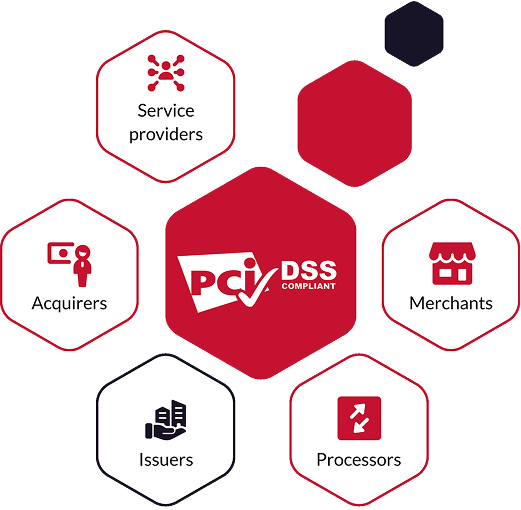PCI DSS Compliance.
PCI DSS made simple with Redseclabs
PCI DSS is the bedrock of security for any organisation handling card transactions, and it’s our expertise that ensures you navigate this certification with ease.
With over a decade of experience in PCI DSS and a fully qualified team, we provide expert guidance through the complexities of data security, making compliance straightforward. Our status as a Qualified Security Assessor (QSA) company also ensures that we have appropriate quality control procedures and the required technical knowledge to be able to conduct PCI DSS assessments.
PCI DSS applies to any business, organisation, or company that accepts, processes, or stores credit card payments and any business that transmits cardholder data (CHD) or sensitive authentication data (SAD). Your business is responsible for safeguarding this highly-sensitive data, and PCI DSS should be a central component of your information security strategy.
PCI DSS compliance for merchants is an annual contractual requirement, with fines for non-compliance. For service providers, while PCI DSS is not mandatory, your merchant clients are likely to expect that you are PCI DSS compliant to aid their own PCI DSS compliance status.


Many organisations lack an in-house PCI-DSS compliance expert, making it hard to access the right guidance when needed. Redwclabs has the expertise and personnel to provide ongoing support as and when required. We offer flexible PCI-DSS call-off days that can be tailored to your requirements with hourly slots for:
Promise: Unlike some other consultancies, we won’t use half a day of consultancy for a 1-hour call. Our pricing is flexible, and unused days can be applied to other services.
If your scope is too big, you waste time and money protecting systems that may not need rigorous PCI controls. Too small, and you may not be protecting what you should. We workwith you to identify the specifics of your scope, covering payment channels, merchant/service provider levels, transaction volumes, system components, personnel, processes, and service providers.
Redseclabs will review your bespoke business processes and produce a scope diagram detailing your PCI-DSS Cardholder Data Environment (CDE), which will give you confidence that all PCI-DSS payment channels are covered. While this option is only required for a more detailed PCI RoC review, Redseclabs recommends this review as a minimum, so your organisation can instantly see where cardholder data is stored, processed, transmitted, and how third parties interact.
To assess your organisation’s PCI-DSS compliance, conducting a Gap Analysis Review with our Redseclabs QSA is recommended. They evaluate your responses in line with your PCI-DSS scope and specific requirements for each payment channel.
This detailed discussion covers all aspects of your payment processes, depending on your PCI SAQ (or RoC) requirements and the involved payment channels. A detailed report highlighting the findings will be created as the output of discussions, containing recommendations on how to reduce the current PCI-DSS scope and options to reduce compliance costs and ease the burden of PCI-DSS.
Quarterly internal vulnerability scans of in-scope networks may be required to meet your PCI validation obligations. Redseclabs can help you meet your PCI scanning requirements with our managed scanning solution.
We will help you understand the vulnerabilities that threaten your environment by producing detailed reports that will highlight the items that need resolving to ensure PCI DSS compliance. The quarterly reports detail the severity of the vulnerabilities and offer remediation advice. This is a managed service that we tailor to your environment using a mixture of agent and IP-based scanning to help ensure all in-scope systems are tested cost-effectively.
There are 10 different PCI SAQ merchant questionnaires., so determining which SAQ applies to your organisation can be challenging. As part of this service, a Redseclabs QSA will assist you with identifying the appropriate SAQ/s and ensure you know what each applicable PCI-DSS requirement means to your organisation.
Redseclabs offers two options regarding the completion of SAQs. Assisted SAQ (aSAQ) Completion involves a Redseclabs QSA working with you to complete the applicable SAQ/s and Attestation of Compliance (AoC) with QSA signature. Attested SAQ (atSAQ) Audit, on the other hand, requires a detailed evidence-based review to check that all answers are correct, meet the standard, and the supporting evidence supports the answer.
For PCI Level 1 merchants (over 6 million transactions annually) and service providers (over 300,000 transactions annually), an annual PCI Report on Compliance (RoC) is mandatory, performed by a PCI QSA-certified organisation. This annual assessment includes a comprehensive review led by a QSA of your payment channels and an evidence-based evaluation of all in-scope systems, personnel, and processes.
At Redseclabs, we leverage our industry experience and technical understanding to validate your environment against the PCI-DSS standard. We ensure your defined scope is correct, and all collated evidence meets the PCI-DSS standard. All client evidence is kept secure as per PCI SSC quality standards and retained for 3 years to ensure your PCI RoC is defendable if ever required.
Quarterly external vulnerability scans of in-scope networks may be required to meet your PCI obligations. The obligations are:
Redseclabs can help you manage your ASV scanning requirements via our user-friendly PCI ASV (Approved Scanning Vendor) portal.
Whilst this PCI DSS requirement is quarterly, it is recommended to scan monthly to ensure your network perimeter is secure.
Penetration and network segmentation tests are an annual PCI DSS requirement (and good general security practice) depending on your PCI DSS scope.
Redseclabs utilises industry-leading tools and in-house based expertise to actively identify security flaws and vulnerabilities within your internal and external infrastructure and applications. Our team will communicate any security issues throughout the test and detail their findings in a factual report, highlighting severity, and remediation advice.
We are trusted numerous companies from different business to meet their needs
Premium Penetration testing with competitive pricing